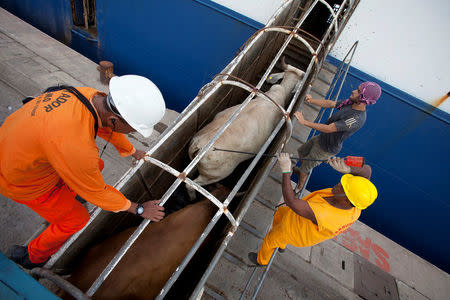EU official urges independent controls over Brazil meat industry
By Anthony Boadle BRASILIA (Reuters) - Brazil needs independent controls over its meat industry, a top EU health official said on Wednesday, as he wrapped up a visit to the country rocked by an anti-corruption investigation centring on bribery of its food-sanitation inspectors. Brazil's police say in court documents bribes were paid to cover up serious health violations by some meat companies, including the sale of rotten and salmonella-contaminated products. Their probe, dubbed "Operation Weak Flesh," led some of Brazil's biggest export markets to ban its meats. The European Union is among the markets that suspended imports from 21 meat packing plants that are under investigation in Brazil, which is the world's largest beef and poultry exporter. EU Commissioner for Health and Food Safety Vytenis Andriukaitis said in an interview that its restrictions and stepped-up checks on Brazilian meat imports may not be removed anytime soon. "The situation of meat imports from Brazil will remain under these reinforced checks until Brazil answers our questions and after our forthcoming audit team visits Brazil," Andriukaitis told Reuters. "The situation will be much clearer in a few weeks or months. The main message to Brazil is that this issue is not closed. It is about health and quality," he said. While he said it was not up to the EU to say what inspection system a country should have, Andriukaitis urged Brazil's government to introduce more transparent rules that avoid public-private conflicts of interest. "The official control system must be independent and not under the influence of politicians and other actors. We must guarantee independence of the Brazilian official control system," he said. Brazil's federal food inspectors currently report to the agriculture ministry and the system has come under fire for having politically appointed supervisors. Andriukaitis said the EU could announce more measures related to Brazilian imports after its Agriculture Council meets on Monday and Tuesday. He declined to be more specific. Hours after he spoke, President Michel Temer and Agriculture Minister Blairo Maggi announced new rules for the meat processing industry, which they said were stricter and clearer. The highest fine for food sanitary violations rose dramatically to 500,000 reais ($160,250) from 15,000 reais previously. Maggi said the rule changes would eliminate the need for inspectors to interpret antiquated laws that were 65 years old. Brazil's Federal Police have accused more than 100 people, mostly inspectors, of taking bribes in exchange for allowing the sale of rancid meat products, falsifying export documents or failing to inspect meatpacking plants at all. Prosecutors have yet to present charges and the police allegations have not been proven. Government officials have sought to downplay the impact of the probe. But an industry group said on Tuesday that beef exports alone fell over 40 percent in terms of both volume and revenue in March 20-26 from the prior week, as a number of countries imposed temporary bans. The police investigation into irregularities in Brazil's meat industry, one of the few robust sectors in an economy locked in its worst recession on record, was made public on March 17. Hong Kong on Tuesday removed one of the last blanket bans on Brazilian meat imports after it said it was satisfied by explanations from Brazilian officials. That followed China's removal of its restrictions last weekend. Together, the two Asian nations bought about one-third of Brazil's $14 billion in meat exports last year. The EU ranks as the No. 2 importer of Brazilian meats, just behind Hong Kong and before China, buying $1.7 billion in frozen and fresh beef, chicken, pork and other meat products last year. ($1 = 3.1200 reais) (Reporting by Anthony Boadle; Additional reporting by Stephen Eisenhammer; Editing by Tom Brown)

 Yahoo Finance
Yahoo Finance 

